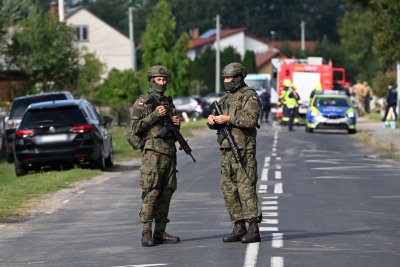
Polish troops man a perimeter guard as emergency services respond to a report of damage to a residential building in Wyryki in eastern Poland after Russian drones penetrated the country’s airspace overnight. Photo by Wojtek Jargilo/EPA
Sept. 10 (UPI) — Polish Prime Minister Donald Tusk said Wednesday that Polish forces and their NATO partners downed a “huge” number of Russian drones overnight, the first time Russian assets have been intercepted in the military alliance’s airspace.
“Last night, the Polish airspace was violated by a huge number of Russian drones. Those drones that posed a direct threat were shot down. I am in constant communication with the Secretary General of NATO and our allies,” Tusk said in a post on X.
He said there were “multiple violations of Polish airspace,” each of which was met by Polish and NATO air defenses, including fighter jets.
Tusk said he was in continual contact with the commander of the operation, the defense minister and the country’s president.
Residents were sent emergency texts alerting them of the air defense operation and requesting them to report any drones they saw or locations where they fell, while people in three regions in the east of the country were told to stay indoors.
Supreme Allied Commander Europe Gen. Alexus Grynkewich said NATO’s swift and decisive response demonstrated both the alliance’s ability and determination “to defend Allied territory.”
Speaking after an emergency meeting of the National Security Bureau, Tusk said Poland was most likely “dealing with a large-scale provocation.” He called the situation “serious” but vowed that Poland was “ready to repel” attacks of this nature.
A number of the drones entered from Belarus airspace, Tusk told lawmakers later Wednesday, and that the last of the objects was shot down at 6:45 a.m. local time.
“I have no reason to claim we’re on the brink of war, but a line has been crossed, and it’s incomparably more dangerous than before. This situation brings us the closest we have been to open conflict since World War Two,” he said.
The incursion came amid a massive Russian airborne attack against neighboring Ukraine involving more than 400 drones and more than 40 cruise and ballistic missiles, with the Ukrainian Air Force saying that as many as 24 drones “crossed the Ukrainian state border flying in Poland’s direction.”
Poland shares borders of roughly equal length with both Ukraine and Belarus.
NATO Allied Command Operations confirmed the clashes were the first time NATO aircraft had engaged with potential threats in “Allied Airspace” with Poland and the Netherlands scrambling fighter jets, Italian early warning aircraft and a NATO air-refuelling tanker airborne and German-supplied Patriot missiles on alert.
“NATO, Supreme Headquarters Allied Powers Europe, and all of Allied Command Operations is committed to defending every kilometer of NATO territory, including our airspace,” said Col. Martin L. O’Donnell, Supreme Headquarters Allied Powers Europe spokesman.
British Prime Minister Keir Starmer issued a statement saying he had been in communication with Tusk over the incident, which he called a “barbaric attack on Ukraine and the egregious and unprecedented violation of Polish and NATO airspace by Russian drones”.
“This was an extremely reckless move by Russia and only serves to remind us of President Putin’s blatant disregard for peace and the constant bombardment innocent Ukrainians face every day.”
The incident came hours after Starmer hosted NATO Secretary General Mark Rutte in Downing Street where they discussed work to integrate U.S. support into plans for a so-called Coalition of the Willing of European countries putting together a reassurance force for Ukraine to uphold any future cease-fire.
Condemning the incursion in “the strongest possible terms,” French President Emmanuel Macron said it was completely unacceptable and that he would meet with Rutte — but did not say when.
Belarus claimed the incursion was accidental, caused by drones turned “rogue” after their systems were jammed, claimed its forces had shot some of them down, and that it communicated with Poland and Lithuania over a five-hour period during the night.
Moscow, however, sought to lay blame on Ukraine, with Russian state television quoting unnamed Polish lawmakers saying it appeared to be a false-flag operation perpetrated by Kyiv.